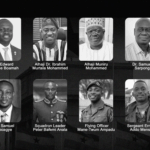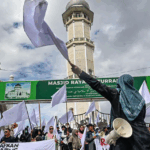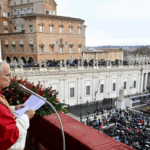
Three days before the untimely deaths of the eight people who perished in the helicopter crash, I was on call with Dr. Murtala Mohamed, a victim of that painful sight. As usual, it was a call to check in on how I was faring and also from my side to check how he was managing his new portfolio as the Minister of Environment, Science and Technology.
He had only assumed that office barely eight months ago, and though the responsibility looked herculean, he sounded determined and eager to serve with conviction. We scheduled another call within the week, but three days later, the helicopter crash came, and I guess that call can never happen because the line between us has been cut forever.
The helicopter crash that claimed his life alongside Dr. Omane Boamah and the six others has left me, and I believe many Ghanaians, deeply shaken. This is not because death is to be feared, for death is inevitable to man, but the manner in which their lives just vanished in a split second. This reflects the frailty of our lives as humans.
As our tradition demands, Ghana gave them a befitting burial. The state pulled out its ceremonial might, with these eight in draped coffins, we poured out our sorrowful tributes, mixed with military salutes and our tears. In our culture, funerals are not just events; they are our final honour to the departed souls, and a public testament to the life they lived. We cry, we sing, we pour libation, and speak their names into eternity.
And yet, after the dirge is silent and the last mourner has gone home, a different Ghana emerges, a Ghana that forgets. We are a people who mourn deeply, but for a season. We are equally people who swiftly move on. When the grave is covered, our memory fades, and life returns to normalcy with our usual politics, routine and noise. I guess our funerals are intense because we know death is real, but we equally forget our pains because we are eager to continue with life.
This forgetting spirit did not start today. After 126 people were killed in the May 9 stampede at the Accra Sport Stadium, we vowed, “ Never Again”. Yet, today, we continue to witness unsafe practices in our sporting venues, with referees and team players chased and beaten. When the Melcom building collapsed, trapping and killing many of our compatriots, we again promised ourselves to ensure stringent regulations in our construction sector. Yet, weak buildings still stand tall in many parts of our cities. When an entire village of Appiaste exploded, killing many and rendering hundreds of others homeless, we again promised ourselves to strengthen reforms in our mining logistics. Today, though Appiaste is rebuilt, the systemic risks remain.
And now, eight men have died while pursuing a cause that strikes at the heart of Ghana’s survival: the fight against galamsey. They perished in service to the land, our rivers and to our forests that have been so much depraved by enemies of the state. Their deaths that shocked our president, kept him in his room and made him shed tears in our moment of grief, should be a thunderclap, shaking us awake. Instead, the thunder seems to be rolling away, and silence lingers. Already, the nation has shifted its gaze to the politics of by-elections, as though the blood spilt in that helicopter was just another news cycle. We all seem to have moved on so quickly.
But galamsey is still here. The River Pra, once the source of drinking water and life for countless communities, still runs brown with mercury and cyanide. The Ankobra and Offin, which sustained farmers and fishermen for generations, are still choked to death. The Birm, which once gave us some of the purest water in Ghana, is still a ghost of itself. Our Atewa forest, Apaprama forest, among other nine forests which served as a jewel of biodiversity and source of water, are still under siege by nation wreckers, some of whom are in our political class. Our rivers are dying, our forests are fast depleting, and our survival as a people hangs in the balance, yet the very menace that sent the eight men into their graves is still robbing Ghana’s soul.
The question is not whether we buried them well, because yes, we did. The question is, will we honour their deaths with change through bold and uncompromising decisions, or will we, as we have too often done, let their sacrifice sink into forgetfulness?
In our tradition, death was never the end; it was a call to the living. Funerals were not just for the dead but reminders to the community of values and unfinished work of the departed. To forget the lessons after death was to dishonour the ancestors. Today, if we allow galamsey to continue unchecked, if we allow politics to overshadow our purpose, then we are not only forgetting Murtala, Omane and the six others, we are betraying them.
Eight great trees in families have fallen. The forests and rivers must not be silent.
If we bury them and move on without change, then it is not just the eight we have lost, it is the soul of Ghana itself that is gone.




